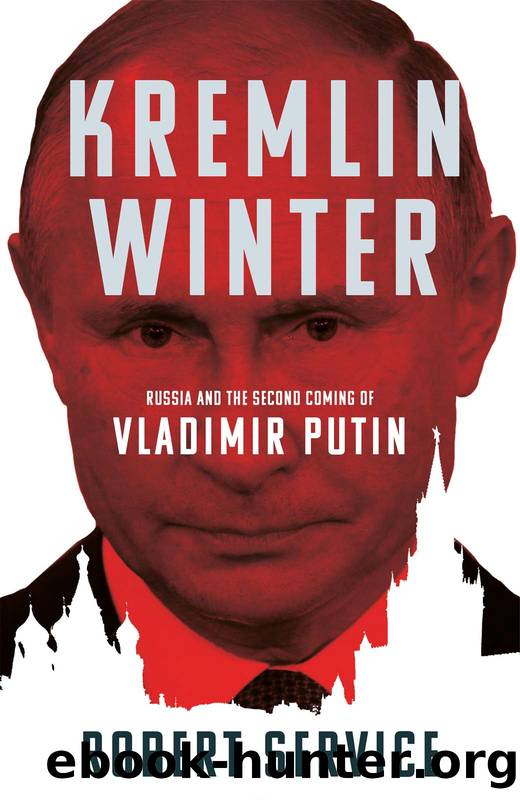Kremlin Winter by Robert Service

Author:Robert Service
Language: eng
Format: epub
Publisher: Pan Macmillan UK
18. PUBLIC OPINION: THE POTENTIAL FOR UNREST
Kremlin leaders have trampled the rule of law in Russia, protecting their dominance with a regime of fear. But they are not the sole culprits. Lower down the ladder of power stand elected officials and businessmen who have fought to ensure the retention of ill-gotten gains. It was a state of affairs predating Putinâs first presidential term, but by introducing greater order to the national patchwork of malpractice he has made a bad situation worse.
The national and regional rulers would not so easily have imposed their kleptocracy had popular attitudes offered a stronger defence. For centuries there was widespread distrust of those in authority among Russian people: from tsarism through to the communist period it was the norm for families to assume that the government in the capital was a parasite on society, and that the courts were skewed in favour of the powerful and well-off. The response was for Russians to put their confidence mainly in relatives and proven friends. When officials of the tsars came looking for taxes and conscripts, it was understandable for peasants to conceal everything they could â and when the landed gentry demanded excessive payment from their peasantry, misrepresentation of the size of the harvest was widespread. Such evasion and downright illegality were only reinforced during the communist dictatorship. When communism collapsed and a wild capitalist economy was introduced to Russia in the 1990s, the natural reaction was for citizens to concentrate trust once more in families and friends rather than a government that had spawned the growth of the so-called oligarchs. Discontent and despair grew as people struggled to cope with the financial depression that subsequently afflicted the economy.1
Little about all this was inevitable and less still intentional. Rulers in the last decade of the twentieth century were plotting a route out of darkness and carrying few reliable searchlights. But they quickly took advantage of a situation that enabled them to pursue policies in their own self-interest, which surprised only those who had overestimated the chances of installing a healthy democracy and the rule of law. Russia in the last decade of the twentieth century had been a society fed up with political rhetoric, distrustful of politicians and sunk in the tasks of putting food on the table and staying employed. Demonstrations grew fewer. Riots were a rarity.
The rulers knew how important it was to monitor both the public mood and developments in high political and business circles. They understood what could happen when public opinion turned sour. Through the late 1980s Gorbachëv was without rival, but in 1990 pollsters reported a sudden dip in his popularity: it turned out to be irreversible. Yeltsin crested a wave of admiration in 1990â91, only to experience a deepening loss of esteem throughout the rest of the decade. Gorbachëv and Yeltsin had drunk from the chalice of acclaim, and choked on its unpalatable dregs. Both oversaw a crisis that unexpectedly became insurmountable, and both had to step down from power.
Download
This site does not store any files on its server. We only index and link to content provided by other sites. Please contact the content providers to delete copyright contents if any and email us, we'll remove relevant links or contents immediately.
Einstein: His Life and Universe by Walter Isaacson(1314)
Finding Freedom: Harry and Meghan and the Making of a Modern Royal Family by Omid Scobie & Carolyn Durand(1175)
Promised Land (9781524763183) by Obama Barack(1154)
Compromised by Peter Strzok(1068)
Finding Freedom by Omid Scobie(1061)
JFK by Fredrik Logevall(993)
Freedom by Sebastian Junger(633)
Salford Lads: The Rise and Fall of Paul Massey by Bernard O'Mahoney(578)
The Russia House by John Le Carré(563)
Kremlin Winter by Robert Service(527)
Day of the Dead by Mark Roberts(514)
Graveyard (Ed & Lorraine Warren Book 1) by Ed Warren & Lorraine Warren & Robert David Chase(506)
A World Ablaze by Craig Harline(505)
Flying Tiger by Samson Jack(501)
Joe Biden: American Dreamer by Evan Osnos(492)
100 Things Successful Leaders Do by Nigel Cumberland(478)
Melania and Me: The Rise and Fall of My Friendship With the First Lady by Stephanie Winston Wolkoff(476)
The Irish Buddhist by Alicia Turner(472)
The Mission by David W. Brown(459)
